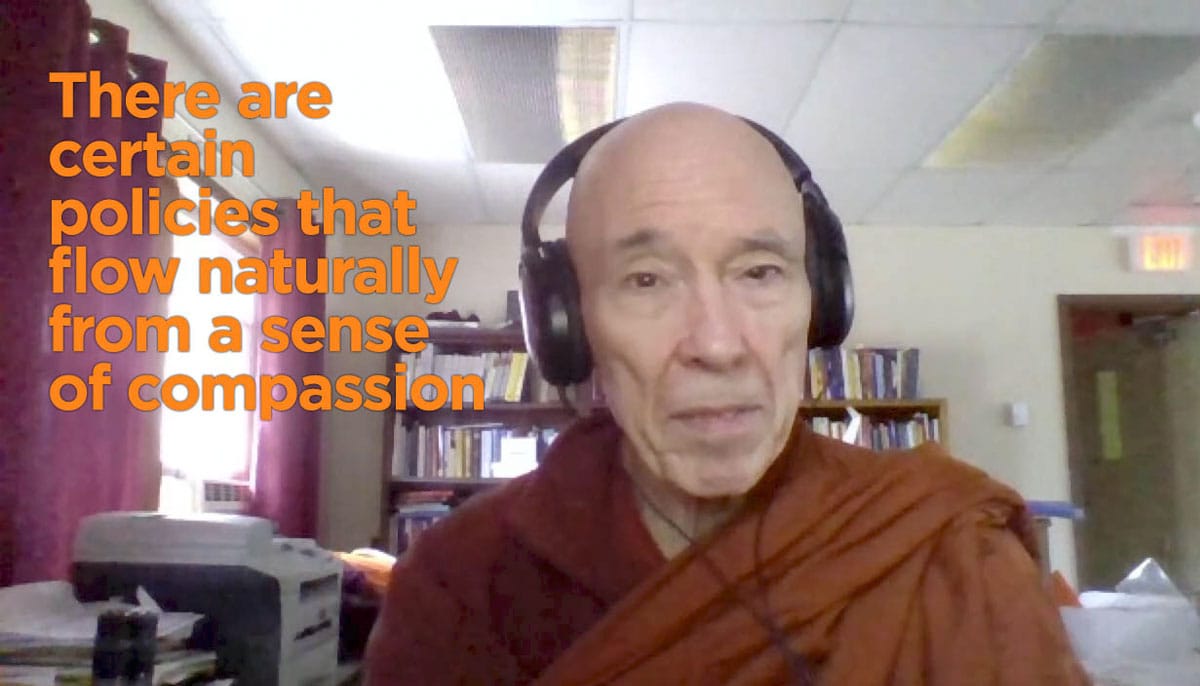In February, 250 Buddhists from across traditions gathered in New York to brainstorm solutions to social issues and discuss the prospect of a joint Buddhist action movement. Buddhist monk and translator Ven. Bhikkhu Bodhi was part of the organizing team for the conference. LionsRoar.com editor Sam Littlefair caught up with Bhikkhu Bodhi to discuss the outcome of the conference, and how Buddhists can take action on issues of public concern together.
Transcript
Sam Littlefair: Hi, my name is Sam Littlefair and I’m the editor of Lionsroar.com. I’m here today with Buddhist monk and translator Bhikkhu Bodhi. Bhante, how are you today?
Bhikkhu Bodhi: I’m fine, thank you.
Sam Littlefair: Great. So earlier this month you helped organize a gathering of about 200 Buddhists in New York City to talk about how Buddhists can come together to address the great social issues of our time. What was the inspiration for that meeting?
Bhikkhu Bodhi: The origins of this go back to around December 2016, after Donald Trump was elected as president. There is a woman, a Buddhist activist living in North Carolina. Her name is Sumi Loundon Kim, and she wrote me an email saying that she’s been feeling very disoriented by the election and she thought maybe it’s time for us to form a kind of Buddhist Council on public affairs.
Initially, we discussed the idea of forming a nationwide Buddhist Progressive Alliance, but it was very, very difficult to get things organized because of the large geographical scope. So then we decided that it would probably be best to begin organizing at a more local level in different localities around the U.S.
Sam Littlefair: At the end of it all, how did you feel it went?
Bhikkhu Bodhi: You know, I thought that the discussions in the afternoon were very stimulating and interesting. But I see this as pretty much just a beginning. What we have to do is find particular issues around which to constellate and draw up ways in which as Buddhists we can make some impact on the particular problems that we’re trying to address. And I would say, I mean we’re all pretty much in agreement about this, that as Buddhists we’re such a small section of the American population, even the New York population, we can’t do very much on our own.
The most effective way to take action would be to link up with other faith organizations, as well as secular organizations that are taking positions on issues of public concern that arouse what I would call a sense of moral conscience. There was a lot of conversation at the conference about forming some sort of national Buddhist coalition, and this is a sort of unprecedented and very ambitious idea.
Sam Littlefair: Is this something that you think might take shape now? If so, what do you see as the next steps?
Bhikkhu Bodhi: The next step, apart from generating and creating a stronger New York nucleus of Buddhist activists, is for nodules of Buddhist activists to get together in other parts of the country. So if we have Buddhist activist groups with common aims, common objectives in those four parts of the country, then we could form together into a coalition, and then hopefully bring on other nodules.
Sam Littlefair: One of the really compelling parts of the conversation was the aspiration of bringing all Buddhists together, which to me brought up the question of how could a progressive activist group like this invite conservative Buddhist views or divergent Buddhist views into the fold?
Bhikkhu Bodhi: Even though we take a progressive position on many of these social and matters of public concern, we’re not endorsing a particular political party or group of politicians. We’re acting primarily on what I would call a sense of moral convictions. I think if there are genuine conservatives, though they might have different opinions about the specifics of policy, when it comes to the basic moral principles of taking care of all our citizens, giving people living in this country a chance to live with dignity, a satisfactory standard of living, working together to preserve a viable climate, ending American militarism overseas, I think both conservatives, as well as progressives, would agree on this from a moral point of view.
Sam Littlefair: How could you imagine a conversation between Trump-supporting Buddhists and progressive leftist, activist Buddhists evolving?
Bhikkhu Bodhi: I imagine this would be an extremely difficult conversation, but I would say that if Buddhists are true to the basic moral principles or ethical principles of the Dharma, rather than committed to a particular political agenda, then they would have to recognize that there are certain policies which flow naturally from a sense of compassion and a sense of human justice, social justice, and economic justice.
